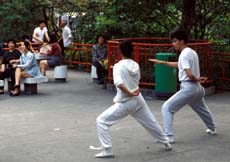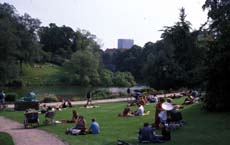Selves as active and passive

Actively maintaining social norms and habits (Hong Kong)

Actively maintaining social norms and habits (Copenhagen)

Actively maintaining social norms and habits (Maine)
We are aware of ourselves as we act in time carried by and influencing histories we did not create but which we must work within, finding ourselves already influenced by rules and norms which we did not create nor choose, but which we must decide upon and interpret and change as we make and remake our social grammars and places. We moderns are self-consciously acting within the process of re-creating meaning, passing on out own re-made self-definitions.
This position -- of creating ourselves anew in the light of an inheritance that functions as a pharmakon, as both a nurturing opportunity and a overwhelming danger -- is not just the situation of philosophy. It is at base what is distinctive about human existence -- that we are not complete as natural beings and that it is only by acquiring culture that we become human. . . . [We need] a repetition that reworks [Heidegger's] account of . . . dwelling in terms of a response to a structure of givenness, rather than the language of decision and decisiveness. Wood 1999, 14f
As we move through time in this active way, splits and categories and grammars are not simple facts we find. Nor are they legislated by some simple self-present subjectivity, whether our own or some social unity. We (plural) actively maintain our self-description and social identity, though we are also carried along by habits, social inertias and ongoing projects. In the way places exist and influence us we can see how habit and social inertia coexist with active repetition and reappropriation.